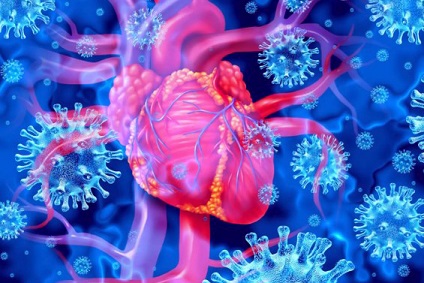Nikhil Prasad Fact checked by:Thailand Medical News Team Oct 01, 2024 1 year, 4 months, 2 days, 12 hours, 47 minutes ago
Medical News: Researchers have uncovered new insights into how COVID-19, caused by the SARS-CoV-2 virus, affects the heart. A recent study has revealed that the virus can infect heart cells, potentially leading to serious heart problems. This
Medical News Team aims to explain these findings in an easy-to-understand way, focusing on the potential long-term effects of COVID-19 on heart health. The study, which used advanced gene analysis techniques, sheds light on how the virus triggers harmful processes in the heart, even in people with no previous heart conditions.
 A New Discovery on How the SARS-CoV-2 Virus Affects the Heart
The Study’s Aim
A New Discovery on How the SARS-CoV-2 Virus Affects the Heart
The Study’s Aim
The researchers set out to explore how COVID-19 might affect the heart, particularly by examining changes in gene expression within heart cells. They focused on a group of 54 RNA samples from heart tissues, using cutting-edge RNA sequencing technology to compare infected and non-infected samples. This technique allowed them to identify key genes that were affected by the virus and to better understand how the virus might lead to heart damage.
What the Researchers Found
The research team found that SARS-CoV-2 can infect heart cells known as cardiomyocytes. These are the cells responsible for contracting and pumping blood throughout the body. When the virus infects these cells, it sets off a harmful chain reaction involving inflammation and the activation of a cellular pathway called TNF-NF-κB. This pathway is important for regulating the immune system, but when it is overactivated, it can lead to inflammation and tissue damage. This could explain why some people with COVID-19 develop heart complications.
How the Virus Affects Heart Cells
The study revealed that SARS-CoV-2 triggers the activation of the TNF-NF-κB pathway in heart cells. This pathway normally helps protect the body from infections by regulating the immune response. However, in COVID-19 patients, this pathway becomes overly active, leading to excessive inflammation. This inflammation can damage heart tissue and increase the risk of heart failure. In particular, the researchers found that the virus causes the overproduction of molecules like cytokines, which are involved in the body’s immune response. When these molecules are produced in large amounts, they can cause harmful inflammation in the heart.
The Role of Inflammation in Heart Damage
Inflammation is a key factor in the development of heart problems in COVID-19 patients. The researchers found that certain genes related to inflammation, such as CXCL2 and MCP-1, were highly active in the heart cells of infected patients. These genes are responsible for attracting immune cells to the site of infection, but they can also cause damage to the heart if their activity is not properly regulated. The overactivation of these genes could lead to chronic inflammation, which can weaken the heart over time.
Heart Complications in COVID-19 Survivors
The findings from this stud
y suggest that even people who recover from COVID-19 may face long-term heart problems. The inflammation caused by the virus can lead to conditions like heart failure, where the heart is unable to pump blood effectively. This could explain why some COVID-19 survivors continue to experience symptoms like fatigue and shortness of breath long after their initial infection. The researchers also noted that the virus might have long-lasting effects on people who had no previous history of heart disease.
The Bigger Picture: Heart Health and COVID-19
The study highlights the importance of monitoring heart health in COVID-19 survivors. Even if a person recovers from the virus, they may still be at risk of developing heart problems later in life. The researchers recommend that people who have had COVID-19, especially those who experienced severe symptoms, should be regularly checked for signs of heart disease. Early detection and treatment could help prevent the long-term effects of COVID-19 on the heart.
What Can Be Done to Reduce Heart Damage?
While the study provides new insights into how COVID-19 affects the heart, it also raises questions about how to treat or prevent these complications. The researchers suggest that more studies are needed to develop targeted therapies that can reduce inflammation in the heart. In the meantime, people who have had COVID-19 should take steps to protect their heart health by staying active, eating a healthy diet, and following their doctor’s advice.
Conclusion
In conclusion, this study provides important new information about how COVID-19 can affect the heart. The researchers found that the virus can infect heart cells and activate harmful pathways that lead to inflammation and tissue damage. This inflammation can increase the risk of heart failure, even in people with no previous heart conditions. The findings suggest that COVID-19 survivors should be monitored for heart problems, and more research is needed to develop treatments that can protect the heart from the long-term effects of the virus.
The study findings were published in the peer-reviewed journal: Scientific Reports.
https://www.nature.com/articles/s41598-024-69635-6
For the latest COVID-19 News, keep on logging to Thailand
Medical News.
Read Also:
https://www.thailandmedical.news/news/study-finds-that-one-third-of-recovered-covid-19-individuals-exhibit-subclinical-ventricular-dysfunction-of-the-heart
https://www.thailandmedical.news/news/warning-two-new-studies-find-that-all-exposed-to-sars-cov-2-are-at-high-risk-of-developing-heart-issues-up-to-a-year-or-longer-after-infection
